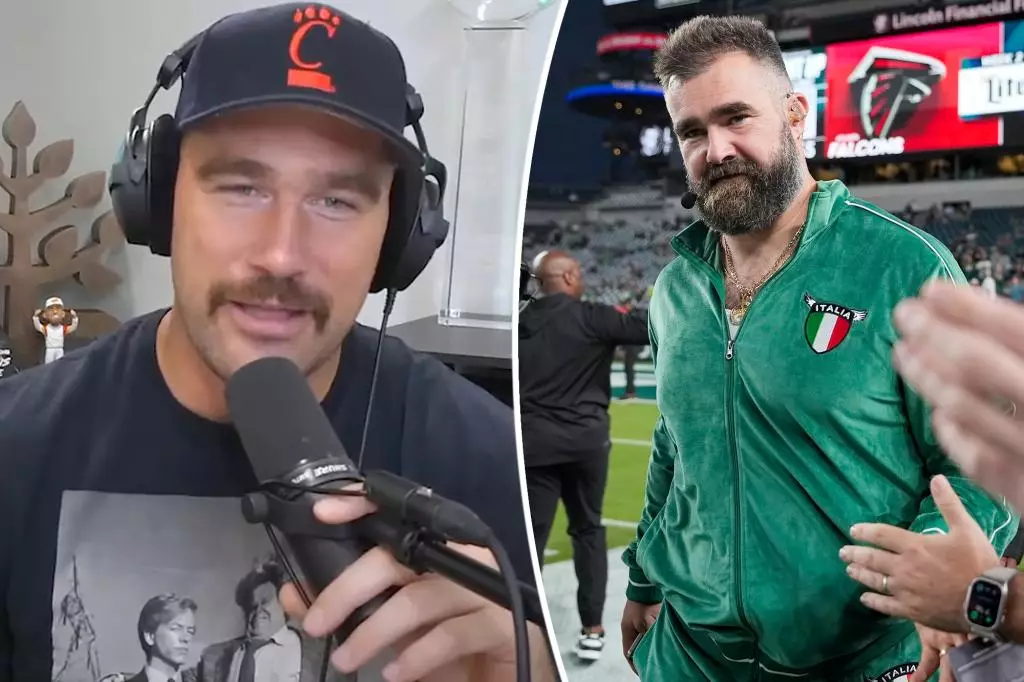Jason Kelce’s recent appearance at the Lincoln Financial Stadium marked not just his return to the Philadelphia Eagles but also hinted at a blossoming new chapter in his life—one that intertwines athletics and fashion. Having retired from the NFL, the 36-year-old seems to be navigating the world of style with the same ease that he once displayed on the football field. His choice of attire—a striking green velour tracksuit—has stirred conversations about his potential transition into the realm of fashion, showcasing how public figures increasingly use their platform to express personal style.
The playful sibling dynamic between Jason and his brother Travis Kelce, an active player for the Kansas City Chiefs, adds layers to their discussions about style. During a recent episode of their podcast “New Heights,” Travis humorously commented on Jason’s dance moves while donning the eye-catching tracksuit, declaring, “You’re the most electric f—king dancer.” This banter not only underscores their close relationship but also reflects the light-hearted side of professional athletes venturing into lifestyle commentary. Jason’s confident admission that he danced “stone-cold sober” adds to his authenticity, inviting listeners and fans alike to appreciate the joy and humor intertwined in brotherly interactions.
Beyond just a playful exchange, Jason’s discussion about fashion touches on a deeper concept: clothing as an extension of identity. In his remarks about feeling “official” while dressed up, he reveals how attire can influence a person’s mindset and demeanor. Travis’ affirmation of this idea supports the notion that dressing well can elevate one’s perception of self, transforming a simple outfit into a “costume” that reflects roles beyond their everyday lives. The term “South Philly tuxedo” coined by Jason embodies a localized identity, revealing how athletes often bring personal and cultural elements into their sartorial choices.
While the vibrant tracksuit choice ignited excitement, it also opened the floor to critique—notably regarding its breathability. Jason’s humorous acknowledgment that “velour, not very breathable” lends candidness to the conversation about fashion, where even style icons can contend with practical difficulties. This self-awareness is refreshing; it reminds us that fashion is not just about the aesthetics but also the comfort and functionality of what we wear. His decision to switch to a more traditional suit reflects adaptability—a quality that resonates deeply in both sports and style.
In their playful banter about fashion mishaps, such as Jason’s infamous last-minute lululemon purchase—an ill-fitting last resort—the brothers reveal the common struggle of maintaining one’s style while navigating the demands of life. Jason’s mockery of Travis’ high-fashion choices, like the all-white Gucci outfit for the US Open, showcases the competitive edge present within their familial relationship. This friendly rivalry not only entertains fans but also emphasizes the evolving narrative of athletes as not just competitors but also style trendsetters.
Jason Kelce’s foray into fashion, marked by sibling camaraderie and self-expression, is a delightful evolution that fans eagerly observe. Whether through his bold tracksuit or comical podcast anecdotes, Jason’s journey underscores a modern narrative where athletes embrace authenticity, personality, and style, allowing them to transcend sports into the realms of culture and fashion.

